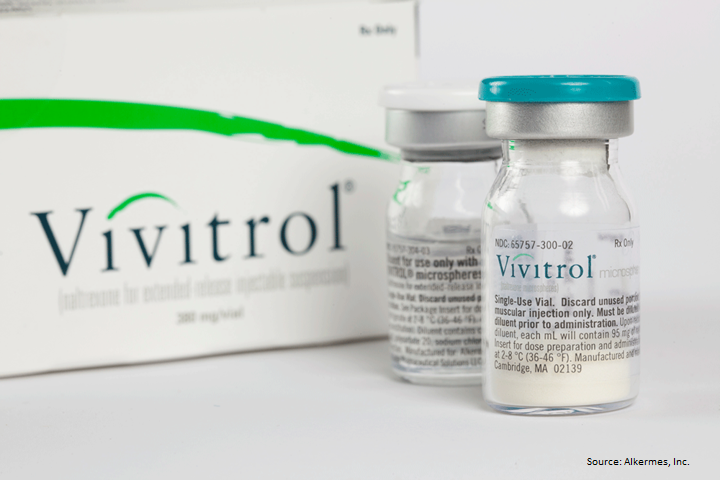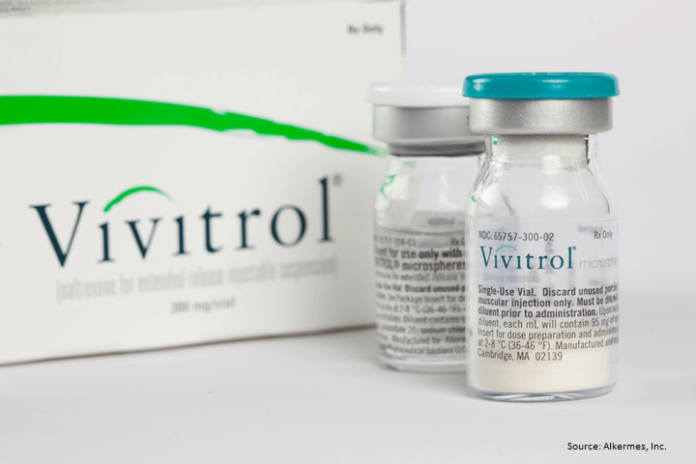An increasing number of U.S. prisons are offering departing inmates Vivitrol to help them stay sober after they’re released.
State prisons in Kentucky, Missouri, Utah, Pennsylvania, Tennessee, Colorado and West Virginia now offer their inmates Vivitrol. And roughly 30 jails in Illinois, Michigan, Missouri, Maryland, New York, Ohio, Utah, Indiana, Wyoming, Kentucky, California, and Wisconsin are also offering Vivitrol to inmates who are on the way out, according to Alkermes, Inc., the company that manufactures and markets Vivitrol.
Vivitrol, which costs as much as $1,000 per shot, has steadily gained acceptance as an effective treatment for opioid dependence since it was approved by the U.S. Food and Drug Administration in 2010.
But it doesn’t come without risks.
A patient who is on Vivitrol will see their tolerance to opioids decline over time, which can become lethal if relapse occurs, according to Dr. Mitra Ahadpour, director of the division of pharmacological therapies at the Substance Abuse and Mental Health Services Administration (SAMHSA). “If a patient reverts back to pre-treatment opioid use, their tolerance has decreased, and they have a very high likelihood [of] having a fatal overdose,” she said.
The warning label and the benefits
Vivitrol is an injectable extended release form of naltrexone. It is considered an opiate antagonist, meaning it blocks the effects of opiates by occupying the opiate receptor sites in the brain and suppresses cravings. In contrast, buprenorphine and methadone are agonists that mimic opiates in the brain.
Common side effects of Vivitrol include diarrhea, headache, nervousness, upset stomach, sleeplessness, depression, toothaches, vomiting and joint or muscle pain. If these side effects occur, patients are encouraged to speak to their healthcare provider or substance treatment practitioner to better adjust or replace the medication.
More serious side effects include liver injury, and alarming reactions to injection sites and worsening skin. Luckily, this can be quickly identified by intense pain, swelling, lumps, blisters, dark scabs, hardening of the area and open wounds.
While using Vivitrol, sudden opioid withdrawal can be caused by using any type of opioid including illegal drugs, prescription painkillers, or cough, cold, or diarrhea medicines containing opioids.
Vivitrol should be administered once a month, and any delay could increase the risk of cravings and relapse. Like medications used in medication-assisted treatment, Vivitrol should be prescribed as part of a comprehensive treatment plan that includes counseling and participation in social support programs for patients, according to SAMHSA.
“It is really important to still continue to have that counseling [and] behavioral therapy, and have them attend and participate in support services,” Ahadpour said.
One of the primary benefits of Vivitrol is that it offers extended release. Patients don’t have to worry about missing a dose, which invariably would increase the risk of relapse.
Is Vivitrol a good fit for you?
Individuals with varying health issues should understand how Vivitrol can work best for them. In some cases, alternative options are better choices.
If patients have HIV/AIDS, Vivitrol can be a better fit than methadone and buprenorphine. Methadone interacts with several antiretroviral treatments for HIV, and buprenorphine causes fewer concerns, but Vivitrol causes almost none. However, some concern should be noted because of the nature of HIV infection among people who use needles.
Vivitrol may not be a good fit for people whose pain needs to be treated with opioid analgesics (painkillers), though. Methadone and buprenorphine offer better results in treating patients because of their opioid agonist properties, meaning they bind to the opioid receptors and provide pain relief. Vivitrol can, however, be used in… (continue reading)

















